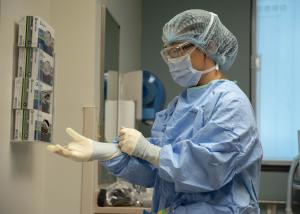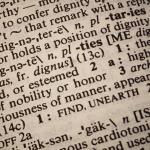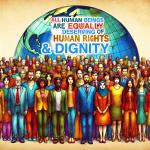
St. Isaac the Syrian reminds us of the consequences which follow if we do not take care of those in need, such as those who are sick: “He who despises the sick will not see light, and the day of him who turns his face from a man straitened by affliction will become darkness; and he who scorns the voice of one suffering hardship, the sons of his house will grope their way in blindness.”[1] Not only is it dangerous to ignore medical advice which can save lives, but, when they are ignored with willful disdain, any death which results can be seen as being the equivalent of murder. We are called to take care of our neighbor. We are to be concerned about their welfare. When we are negligent, when we could save someone’s life but we choose not to because it in interferes with what we would rather be doing, we are culpable for their death. This is why St. Cyril of Jerusalem could declare someone to be a murderer, not because they physically assaulted or killed a child, but because they prevented a child from getting the medical care they needed: “For when the child might have been saved by medical treatment, be [he – HK] became his murderer by sending away the physicians, since by denying him medical care, he caused his death.”[2] Physicians are expected to do what they can to take care of their patients, making sure they do not suffer needless harm; and just like those who prevent doctors from attending those in need can, in some situations, be shown culpable for their death, doctors whose patients die due to their negligence should be held responsible for those deaths:
“Thou shalt do no murder.” Amongst others, doctors murder by their ignorance of the sick man’s illness when they prescribe him injurious medicine. Those also commit murder who will not have a doctor to attend them or another person who is ill and requires the doctor’s help. Those commit murder who irritate a sick man to whom any irritation may be fatal — for instance, a consumptive person – and thus hasten to his death. Those commit murder who, through avarice or any other bad reason, delay in affording the doctor’s help to a sick person, or in giving bread to the hungry. [3]
The sick, likewise, also have a responsibility to take care of their neighbor. They should protect society if they are suffering from a contagious disease, especially if the contagion is one which has the potential to cause serious long-term harm if not death. If they intentionally ignore proper safety cautions such as masking and social distancing, and others become infected and die as a result of their negligence, they should be held responsible. Sadly, we find ourselves living in a very selfish time, where the sick are not concerned about the welfare of their neighbor; they will ignore all precautions, thinking they know better than the medical community. Indeed, many of them will try to cure their illness through all kinds of pseudo-medical advice (as we have seen with COVID19). Sadly, but not surprising, way too many people of them have died as a result of such indifference to the common good. “When a sick person, out of contempt for others, tries to cure himself, he falls into destruction. He should seek an experienced physician who can provide a remedy for his illness.” [4] Indeed, as Firmicus Maternus understood, those who are sick often are not in their right mind; they will reject cures, thinking they are better off without them. Then, when they find themselves getting sicker, they might accept medical care, but then the treatment will be much harsher than what it could have been if they followed sound medical advice earlier:
Sick persons like what is not good for them, and when ill health takes control of the human frame the sufferer makes perverse demands, counter to their own welfare. The mind, preyed upon by the languor of affliction, incessantly craves what will merely aggravate the disease. Spurns with contempt the healing arts, and hastens with impatient desire to its own downfall. Then if the mischief of the disease grows worse, stouter remedies are invoked; the medical art, solicitous for the patent’s welfare, resorts to sterner measures. Disagreeable foods and bitter potions are forced upon the unwilling sufferer, and if the trouble worsens both cautery and knife are tried. So when the patient recovers his health and he has his well-being restored, he acknowledges with a revival of sound judgment that whatever was done to him against his will for the infirmity of his sick body, was all done for his own good.[5]
We must be concerned for the sick, and do what we can for them, even if sometimes that means making them do things contrary to their wishes such as restricting their movement when they are sick. Sadly, we see many of them do not do so, as they cough and sneeze upon their neighbors, even at church, showing why it often becomes necessary for society to restrict their movement with a quarantine until they are no longer sick with a deadly contagion. Of course, when such a necessity arises, we must do so with compassion and understanding, trying to make everyone as comfortable as possible. We should never be cruel, even if sometimes we might need to be stern with those who would like to ignore sound medical advice. Clearly, during a pandemic, we will have to do things which we would not do at other times, and in doing so, we do so for the sake of life and human dignity. We cannot just a pandemic and act like everything is normal. If masking, social distancing, and or vaccines are necessary, we should employ their use. Just as we would not excuse drunk drivers who recklessly get in an accident and kill someone, so we should not excuse those who know they are sick (or potentially sick) with a deadly disease and recklessly infect others. It is not a violation of freedom to tell an inebriated person they cannot drive a car so long as they are drunk; similarly, it is not a violation of freedom, or human rights, but rather their affirmation, to tell protect society with sound measures during a pandemic. This is why, if there is, as some think, the potential that masking mandates and social distancing might need to be used once again to contain the spread of COVID, the only Christian response is to follow them. Currently, there are no such measures being put in place, and only fearmongering being raised against them, trying to make sure proper safety measures are never put in place again. Who benefits from that? Certainly, to resist such measures, to fight against them, goes against the teachings of Jesus who consistently made it clear we should take care of our neighbor. How can someone claim they are following Jesus, or that they are pro-life, if they are not willing to do something so simple as to mask or take a vaccine if they can save the lives of others? Their lack of care for their neighbor, their selfishness in the midst of trials and tribulations, reveals their true character. Just as Jesus said those who fed the poor or took care of the naked took care of him, and so will be welcomed in the kingdom of God, so those who took care of their neighbor during a pandemic, even if they are not Christian, will find themselves rewarded over so-called Christians who did all they could do to ignore such safety concerns. This is why, for Christians, the only thing they can do during a pandemic, if they are to be authentic followers of Christ, is to listen to and heed sound medical advice, and do what they can to protect society as a whole.
[1] Saint Isaac the Syrian, The Ascetical Homilies of Saint Isaac the Syrian. Trans. Monks of the Holy Transfiguration Monastery. Rev. 2nd ed (Boston, MA: Holy Transfiguration Monastery, 2011), 532 [Homily 76].
[2] St. Cyril of Jerusalem, Procatechesis and Catechesis 1-12. Trans. Leo P. McCauley, SJ and Anthony A Stephenson (Washington, DC: CUA Press, 1969), 162 [Catechesis VI].
[3] St John of Kronstadt, My Life in Christ. Trans. E.E. Goulaeff (London: Cassel and Company, Ltd., 1897; repr. Jordanville, NY: Holy Trinity Monastery, 2000), 140.
[4] Sharafuddin Maneri, The Hundred Letters. Trans. Paul Jackson, SJ (New York: Paulist Press, 1980), 36 [Letter 7].
[5] Firmicus Maternus, The Error of the Pagan Religions. Trans. Clarence A. Forbes (New York: Newman Press, 1970), 78.
Stay in touch! Like A Little Bit of Nothing on Facebook.
If you liked what you read, please consider sharing it with your friends and family!
N.B.: While I read comments to moderate them, I rarely respond to them. If I don’t respond to your comment directly, don’t assume I am unthankful for it. I appreciate it. But I want readers to feel free to ask questions, and hopefully, dialogue with each other. I have shared what I wanted to say, though some responses will get a brief reply by me, or, if I find it interesting and something I can engage fully, as the foundation for another post. I have had many posts inspired or improved upon thanks to my readers.

















